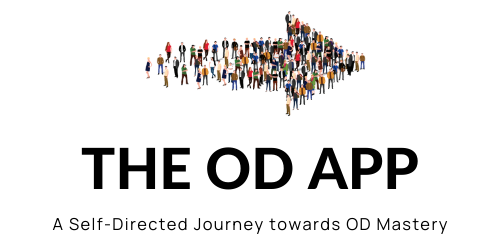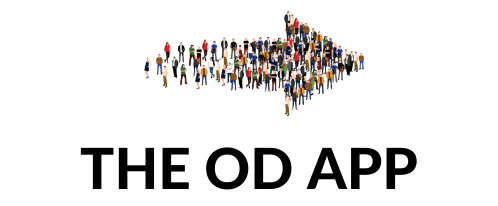Part 1 – How the author became interested in Dialogic OD
I became invested in organization development as an undergraduate trying to make change at my university in Montréal. Realizing that my power-coercive tactics were not creating the results I wanted, and experiencing a T-group course, I plunged into the OD world with the support of early mentors. I then went to Case Western Reserve University for my PhD, where Ron Fry was my supervisor and Dave Cooperrider a fellow student.
I was an early adopter of Appreciative Inquiry but had the experience that sometimes it worked and sometimes it didn’t, and had no good theory for why. A meta-analysis I did with Aniq Kassam, in the early 2000s, revealed that when AI was used in a traditional OD action research cycle (AR with a positive question) it did not create transformational change. Instead, those projects that created a generative image and used an emergent approach to taking action were the transformational ones.
Thus began my exploration and experimentation with the notion that something had changed in how successful transformation was done that was not being recognized in the textbooks and graduate programmes. I eventually met Bob Marshak, who was coming to similar conclusions but from a different path. Since 2007, Bob and I have been working together to study, frame, and expand the discipline of Dialogic OD.
Part 2 – What is Dialogic Organization Development?
Dialogic OD is a label used to distinguish a mindset about organizations, leadership, and change that is different from foundational Diagnostic OD. Gervase Bushe and Bob Marshak introduced the concept in 2009 to show that new forms of organization development had emerged since the mid-1980s (like Appreciative Inquiry, future search, open space, and World Café, among many others) that did not conform with, and in some ways violated, central principles of OD found in textbooks and taught in graduate programmes. Since then, theory and research on Dialogic OD has expanded rapidly. Bushe and Marshak argue that each OD practitioner is likely to use a unique combination of diagnostic and dialogic mindsets in their practice.
In the 2015 textbook on Dialogic Organization Development, Edgar Schein describes Dialogic OD as a return to the roots of OD’s original ‘spirit of inquiry’, and opined that Dialogic OD may have emerged because organizational problems are now more complex, ambiguous, and uncertain. Since then, the idea that Diagnostic OD is better suited to complicated, technical problems and Dialogic OD better suited to complex, adaptive challenges, has been echoed by others.
Different Premises and Patterns of Practice between Diagnostic and Dialogic OD
| Diagnostic OD | Dialogic OD | |
| Influenced by | Classical science, positivism, and modernist philosophy | Interpretive approaches, social constructionism, emergence and complexity sciences |
| Dominant Organizational Construct | Organizations are like living systems | Organizations are meaning-making systems |
Ontology and Epistemology | Reality is an objective fact.There is a single reality.Truth is transcendent and discoverable.Reality can be discovered using rational and analytic processes. | Reality is socially constructed.There are multiple realities.Truth is immanent and emerges from the situation.Reality is negotiated and may involve power and political processes. |
Constructs of Change | Collecting and applying valid data, using objective problem-solving methods, leads to change.Change can be created, planned, and managed.Change is episodic, linear, and goal oriented. | Creating containers and processes, to produce generative ideas, leads to change.Change can be encouraged but is mainly self-organizing.Change is emergent, continuous, and/or cyclical. |
| Focus of Change | Emphasis on changing behaviour and what people do | Emphasis on changing mindsets and what people think |
The Key Elements of the Dialogic Mindset – for Leaders and Consultants
- The meanings and interpretations people make about ‘objective reality’ guide how they think and what they, in turn, do.
- Organizations are social networks of meaning making that create the organizational realities that people experience and react to.
- Transformational leadership helps shape how meanings are made, especially the implicit storylines and narratives that guide people’s experience.
- Organizations are continuously changing, in both intended and unintended ways, with multiple and different types of changes occurring at various speeds.
- Groups and organizations are continuously self-organizing and re-creating themselves, but disruption to repetitive and limiting patterns is required for transformational adaptation and change to occur.
- Complexity makes it impossible to predict outcomes, so the best approach is to use emergent change processes to develop adaptive capacities and solutions.
- Leading emergent, transformational change requires mobilizing stakeholders to self-initiate action, then to nurture and amplify the most promising initiatives.
- Change facilitators are embedded in the change process, not independent from it.
The Three Enablers of Change from the Dialogic Mindset
Emergence
Stimulate the processes of disruption and emergence to facilitate self-organizing that creates new patterns of organizing that are better suited to current needs and conditions.
Narrative
Change the core narratives that guide thinking and acting.
Generativity
Create generative conversations that produce new ideas and allow people to think and act in ways they couldn’t consider before.
Types of Dialogic OD
Some Dialogic OD methods are ‘episodic’ – they have a beginning, middle, and end.
Some are ‘continuous’ – the practitioner partners with the client system in an ongoing OD process.
Some dialogic methods are ‘large group’ – they use a generative change approach to engage the stakeholders, who will have to change in generative conversations that will lead to self-initiated, emergent, changes.
Some are ‘interactive’ – these are sometimes called dialogic process consulting: they work by disrupting stale, habitual, ineffective patterns of interactions, to provoke generative conversations that lead to new patterns emerging and new narratives being formed.
Part 3 – Generative Change and Dialogic OD
The Dialogic Mindset gravitates toward generative change processes, instead of planned change processes. Instead of providing visions and top-down implementation of plans, generative change leaders host conversations where diverse views and ideas lead to the emergence of new possibilities. Participants are encouraged and supported in advancing new ways of talking, thinking, and acting. Successful advances and adaptations, along with new supporting narratives, are spread throughout the system. Leaders endorse and provide resources to these activities but do not direct them in the traditional sense.

The new BMI Series in Dialogic OD is a set of short books on specific aspects of the Dialogic Mindset that can be applied to a variety of OD methods.
A large number of articles and videos on Dialogic OD can be found for free at the Bushe-Marshak Institute for Dialogic Organization Development.
Part 4 – Skills and Competencies of Dialogic OD Practitioners
Dialogic OD practitioners hold the same values and ideals as Diagnostic practitioners, and they utilise many of the same basic skills. These include skills for entry and contracting, coaching, group process and organizational analysis, intervention design and delivery – underpinned by self-awareness and use of self as an evocative and provocative presence.
There are a large variety of Dialogic OD methods that a well-educated practitioner should be familiar with. An ever expanding bibliography is available for free by registering on the BMI website.
Specialized competencies for Dialogic OD practitioners include four major categories:
Dialogic Intervention Skills
These are skills for observing and intervening into the social construction of reality as it occurs.
These competencies include:
- Articulating what is involved in a Dialogic approach and why and when it is most applicable
- Noting the narratives that are guiding thinking and acting
- Uncovering the conceptual metaphors and scripts that are guiding people’s conversations
- Making visible organizing ideologies that uphold and constrain what is considered normal, including how current activities of communication – power-relating, and intending, choosing and acting – play out
- Reframing to better articulate the intentions behind what people are trying to achieve
- Creating generative images that allow people to see things anew and consider new possibilities
- Designing propositional/linguistic questions and expressive/embodied experiences that disrupt routinized conversations and patterns of interactions, and stimulating emergence of more functional patterns
- Containing anxiety sufficiently for novelty and disturbance to be engaged within a state of curiosity, without collapsing into defensive reactions
- Using one’s own authority and humility to engage productively with everyday politics and the necessity of providing both support (amplification and appreciation) and challenge (calling out, truth-telling, and confronting)
- Improvising with high degrees of collaboration and spontaneity, working in the moment with high levels of reflexivity and tolerance to ambiguity, not knowing, and emergence
- Using various activities and methods to facilitate development of alternative and more beneficial scripts and narratives, such as re-authoring core organizational stories that are limiting adaptive actions moving forward.
Event Design
These are skills for designing a sequence of activities that occur in a single meeting, where people engage in generative conversations – conversations that create new ideas that people want to act on. These competencies include:
- Creating events where participants manage themselves and own their own outcomes
- Designing questions that match the needs and opportunities presented by the organizations or group’s intentions and the patterns of interaction as they emerge
- Identifying methods for rapid collective inquiry and meaning making
- Cultivating the ability to mix and match a variety of Dialogic OD methods to meet the current needs
- Utilising sequences of discovery and design, reflecting and intending, differentiation and integration, experiencing and meaning making, where multiple perspectives are revealed and considered by the participants and where participants develop syntheses, transcend polarities, and develop new and more-encompassing frameworks/perspectives
- Designing a path from inquiry to action
- Designing pre-event, event, and post-event coherence.
Hosting
Hosting is different from the facilitation skills common to Diagnostic OD professionals. It is about creating an environment in which participants lead themselves, rather than being led by the practitioner.
This requires event design skills, plus the following:
- Identifying processes for effective invitation (non-coercive, inspiring, etc.)
- Designing supportive containers (time, space, and process) for generative conversations
- Managing boundaries for focus and energy
- Crafting participant materials (e.g., manuals, guidebooks) that support self-management
- Connecting people for optimal generativity
- Knowing when to step in and when to step out – for example when processes of instrumentalization, rescuing, or coercion arise in oneself and/or in the community/group, or when novelty/diversity is subtly repressed by the desire to normalise to previous routines and rituals.
Strategic Process Design
This is the ability to identify a sequence of conversations and events to achieve a desired change. These competencies include:
- Articulating what will need to happen for the group or organization to achieve the purpose of the change process
- Understanding the generative change model and how to adapt it to the current situation
- Having political awareness of the sponsorship that will be necessary for a successful change process, and the ability to cultivate that sponsorship
- Ability to help the client identify and engage the stakeholders needed in the change process
- Co-creating and upskilling planning teams of stakeholders to design the change process
- Providing (or supporting the provision of) a coherent narrative that makes sense of the change process
- Identifying how the outputs of one conversation/event lead into the next conversation/event
- Identifying the processes and resources sponsors will need to monitor, nurture, amplify, and embed innovations that emerge from events.
Part 5 – Resources for Developing Dialogic OD skills
Reading
- The major textbook on Dialogic OD, edited by Gervase Bushe and Robert Marshak, is Dialogic Organization Development: The Theory and Practice of Transformational Change (Berrett-Koehler, 2015).
- Bushe and Marshak have produced over 50 articles and chapters on Dialogic OD. These range from brief overviews to academic studies. They are all available for download at the Bushe-Marshak Institute. A description of each paper is available here.
- At the Bushe-Marshak Institute website you can also find downloads for related articles written by others on both the practice and theory of Dialogic OD.
- Bushe & Marshak also edit and publish the BMI Series in Dialogic OD. Each book in the series is 100 pages long, focuses on one aspect of Dialogic OD practice, and contains lots of examples to illustrate the practice. They are available for purchase exclusively on Amazon.
Watching
There are a growing number of videos that discuss Dialogic OD. For a list of videos on YouTube curated by Gervase Bushe go here.
- This video describes the evolution from Diagnostic to Dialogic OD.
- This video may be the best introduction to the theory of Dialogic OD.
- This video describes the Generative Change model.
- This video describes Dialogic Team Coaching.
- There are also short videos on Dialogic Process Consulting, Hosting, Doing Dialogic OD online and Co-Creating Planning teams in the play list.
Courses
The Bushe-Marshak Institute, in partnership with the Cape Cod Institute and Lacerta Academy, offers a series of online, live courses, as well as online asynchronous courses. They also offer a path to certification as a professional Dialogic OD Professional. You can learn more about the programs here.
There are also many opportunities to learn specific Dialogic OD methods. Some of the more popular, which you can find learning opportunities through an online search, include:
- Appreciative Inquiry
- Art of Hosting
- Co-Design
- Conferencing
- Future Search
- Open Space Technology
- Solution Focused Working
- Technology of Participation
- Theory U
- Word Café




